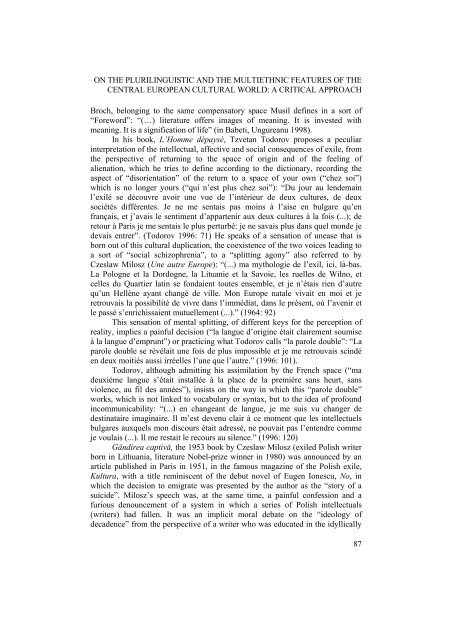culture, subculture and counterculture - Facultatea de Litere
culture, subculture and counterculture - Facultatea de Litere
culture, subculture and counterculture - Facultatea de Litere
You also want an ePaper? Increase the reach of your titles
YUMPU automatically turns print PDFs into web optimized ePapers that Google loves.
ON THE PLURILINGUISTIC AND THE MULTIETHNIC FEATURES OF THE<br />
CENTRAL EUROPEAN CULTURAL WORLD: A CRITICAL APPROACH<br />
Broch, belonging to the same compensatory space Musil <strong>de</strong>fines in a sort of<br />
“Foreword”: “(…) literature offers images of meaning. It is invested with<br />
meaning. It is a signification of life” (in Babeti, Ungureanu 1998).<br />
In his book, L’Homme dépaysé, Tzvetan Todorov proposes a peculiar<br />
interpretation of the intellectual, affective <strong>and</strong> social consequences of exile, from<br />
the perspective of returning to the space of origin <strong>and</strong> of the feeling of<br />
alienation, which he tries to <strong>de</strong>fine according to the dictionary, recording the<br />
aspect of “disorientation” of the return to a space of your own (“chez soi”)<br />
which is no longer yours (“qui n’est plus chez soi”): “Du jour au len<strong>de</strong>main<br />
l’exilé se découvre avoir une vue <strong>de</strong> l’intérieur <strong>de</strong> <strong>de</strong>ux <strong>culture</strong>s, <strong>de</strong> <strong>de</strong>ux<br />
sociétés différentes. Je ne me sentais pas moins à l’aise en bulgare qu’en<br />
français, et j’avais le sentiment d’appartenir aux <strong>de</strong>ux <strong>culture</strong>s à la fois (...); <strong>de</strong><br />
retour à Paris je me sentais le plus perturbé: je ne savais plus dans quel mon<strong>de</strong> je<br />
<strong>de</strong>vais entrer”. (Todorov 1996: 71) He speaks of a sensation of unease that is<br />
born out of this cultural duplication, the coexistence of the two voices leading to<br />
a sort of “social schizophrenia”, to a “splitting agony” also referred to by<br />
Czeslaw Milosz (Une autre Europe): “(...) ma mythologie <strong>de</strong> l’exil, ici, là-bas.<br />
La Pologne et la Dordogne, la Lituanie et la Savoie, les ruelles <strong>de</strong> Wilno, et<br />
celles du Quartier latin se fondaient toutes ensemble, et je n’étais rien d’autre<br />
qu’un Hellène ayant changé <strong>de</strong> ville. Mon Europe natale vivait en moi et je<br />
retrouvais la possibilité <strong>de</strong> vivre dans l’immédiat, dans le présent, où l’avenir et<br />
le passé s’enrichissaient mutuellement (...).” (1964: 92)<br />
This sensation of mental splitting, of different keys for the perception of<br />
reality, implies a painful <strong>de</strong>cision (“la langue d’origine était clairement soumise<br />
à la langue d’emprunt”) or practicing what Todorov calls “la parole double”: “La<br />
parole double se révélait une fois <strong>de</strong> plus impossible et je me retrouvais scindé<br />
en <strong>de</strong>ux moitiés aussi irréelles l’une que l’autre.” (1996: 101).<br />
Todorov, although admitting his assimilation by the French space (“ma<br />
<strong>de</strong>uxième langue s’était installée à la place <strong>de</strong> la première sans heurt, sans<br />
violence, au fil <strong>de</strong>s années”), insists on the way in which this “parole double”<br />
works, which is not linked to vocabulary or syntax, but to the i<strong>de</strong>a of profound<br />
incommunicability: “(...) en changeant <strong>de</strong> langue, je me suis vu changer <strong>de</strong><br />
<strong>de</strong>stinataire imaginaire. Il m’est <strong>de</strong>venu clair à ce moment que les intellectuels<br />
bulgares auxquels mon discours était adressé, ne pouvait pas l’entendre comme<br />
je voulais (...). Il me restait le recours au silence.” (1996: 120)<br />
Gândirea captivă, the 1953 book by Czeslaw Milosz (exiled Polish writer<br />
born in Lithuania, literature Nobel-prize winner in 1980) was announced by an<br />
article published in Paris in 1951, in the famous magazine of the Polish exile,<br />
Kultura, with a title reminiscent of the <strong>de</strong>but novel of Eugen Ionescu, No, in<br />
which the <strong>de</strong>cision to emigrate was presented by the author as the “story of a<br />
suici<strong>de</strong>”. Milosz’s speech was, at the same time, a painful confession <strong>and</strong> a<br />
furious <strong>de</strong>nouncement of a system in which a series of Polish intellectuals<br />
(writers) had fallen. It was an implicit moral <strong>de</strong>bate on the “i<strong>de</strong>ology of<br />
<strong>de</strong>ca<strong>de</strong>nce” from the perspective of a writer who was educated in the idyllically<br />
87












